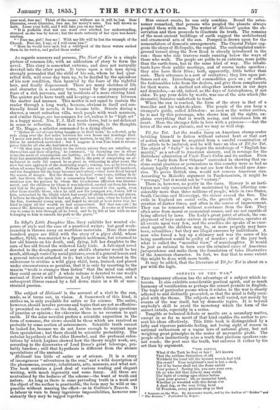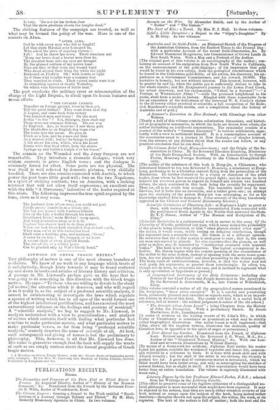SONNETS ON THE WAR.*
Tins temporary effusion has the advantage of a subject which in- terests. It also exhibits considerable poetical spirit, and as much, harmony of versification as perhaps the sonnet permits in English. The topic of particular poems when it relates to the war is closely adhered to and distinctly presented, so that the mind is fully occu- pied with the theme. The subjects are well varied, not merely by events of the war itself, but by domestic topics. It is beyond anybody's skill to avoid the monotony which the form of the sonnet entails, especially in a series. Tangible or technical defects or merits are a secondary matter, except in as far as merit of that kind enables the author to pre- sent his ideas effectively. This little book is distinguished by a i lofty and vigorous patriotic feeling, not losing sight of reason n national enthusiasm or a vague love of national glory, but not weighing great principles in the scales of mercantile profit. The people often instinctively seize a truth that platform speakers can- not reach; the poet sees the truth, but enforces it rather by his art than by argument.
"VOX POPULL
What if the Turk be foul or fair ? Is't known That the sublime Samaritan of old Withheld his hand till the bruised wretch had told His creed ? Your neighbour's roof is but a shed, Yet if he burns shall not the flame enfold Your palace ? Saving his, you save your own. Oh ye who fall that Liberty may stand, The light of coming ages shines before Upon your graves ! Oh ye immortal band, hether ye wrestled with this Satan o'er A dead dog, or the very living head Of Freedom, every precious drop ye bled
• Sonnets on the War. By Alexander Smith, and by the Author of" Balder" and " The Roman." Published by Bogue.
Is holy. 'Tie not for his broken door That the stern goodman shoots the burglar dead."
The striking features of the campaign are treated, as well as what may be termed the policy of the war. Here is one of the sonnets on Alma.
"AFTER ALMA.
God be with every man who fell or fought! Let that stern Marshal ever honoured be,
Who asked the price of dazzling victory—
Life ! And he threw his down. There slumbers not 'Meng our brave dead a braver man than he.
The proudest tears into my eyes are brought
By the plumed soldiers of my native land : Sons are they of that worn and wasted band Who stood around their King the while the night Darkened on Flodden. Oh! with hearth as light As if these wild heights were a summer feat They marched to death. Their ruined ranks were true As crumbling squares at deadly Waterloo, On which vain hurricanes of battle beat."
The poet overlooks the military error or misconception of the charge of the Light Brigade, to dwell upon its heroic) features and moral effects.
"THE CAVALRY CHARGE.
Traveller on foreign ground, whoe'er thou art, Tell the great tidings! They went down that day A Legion, and came back from victory Two hundred men and Glory ! On the mart Is this "to lose" ? Yet, Stranger, thou shalt say These were our common Britons. 'Tis our way In England. Aye, ye heavens ! I saw them part The Death-Sea as an English dog leaps o'er The rocks into the ocean. He goes in Thick as a lion, and he comes out thin As a starved wolf ; but lo ! he brings to shore A life above his own, which, when his heart Bursts with that final effort, from the stones Springs up and builds a temple o'er his bones."
• The sonnets on the Wounded and the Army Surgeon are not remarkable. They introduce a dramatic dialogue, which very seldom succeeds in grave English verse ; and the dialogue is obviously forced for effect. Some parts are too physical. The war itself is well relieved by domestic pictures, very skilfully handled. There are also sonnets connected with Austria, to which power the poet bears little good-will ; two on the two Napoleons, in a spirit of striking contrast; two on America, with a lurking mistrust that will not allow itself expression; • an excellent one with the title "A Statesman," indicative of' the leader required at this crisis. The following impresses the true spirit required by the time, stern as it may seem. " wAx.
The husband from Whose arms you could not part
Sleep among hundreds in a bloody pit ;
The boy you nursed with fondness infinite Lies on the hill, a bullet through his heart.
Bewildered Bride mute lother I creep apart,
And weep }ourselves away as it is fit. England has sterner work to do than grieve. When our best blood bath drenched that distant tarth, 'What man soc'er in this embattled land Shall raise a hushing arm, and murmur, 'Cease,' A curse be on him ! W e conquer, or we leave A vacant chair at evt ry English hearth. - The far-off ]ilI' of a worthy peace Can be plucked only by War's bloody hand."































 Previous page
Previous page